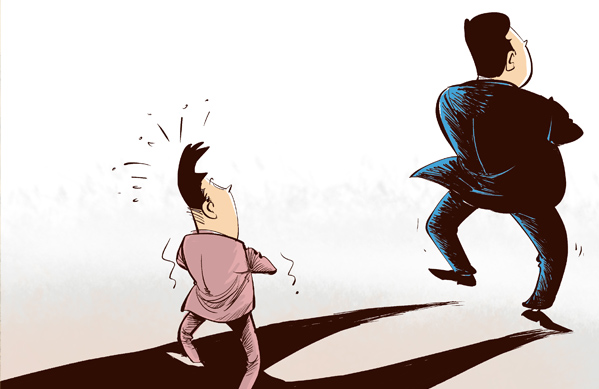Mass culture should reflect national spirit of China

Shadow play
All you see is imitation,
Copying and adaptation,
In ev’ry theater and TV station.
The present situation,
Shows a fundamental limitation,
Of creativity and imagination.
If one follows blindly,
Like a drone,
Another’s work,
Will overshadow your own.
One must struggle and toil;
So that culture finds root,
In the national soil.
Why follow a Korean fad,
When something better could be had?
Tradition is the key,
To foster cultural prosperity.
(Cartoon by Gou Ben; Poem by Long Yuan)
In recent years, Chinese TV networks have embraced a growing number of foreign or domestically adapted films, TV series and entertainment programs. A prominent example of this has been the influence of the “Korean Wave,” a term that refers to the increased popularity of South Korean culture worldwide. Access to entertainment has also been a key factor, with many Chinese viewers watching foreign TV programs and films downloaded to mobile devices including smartphones and tablets.
However, the popularity of foreign cultural exports in China has undermined the local cultural sector. It has also raised questions over how China can promote homegrown cultural products to domestic audiences and be more competitive on a global scale.
Profits ahead of spirituality
So, why is there a homegrown obsession with foreign cultural products and how can Chinese cultural exports build soft power? When comparing Chinese cultural products with those from overseas, we find China’s cultural products, dominated by TV entertainment programs, generally fail to capture the “cultural spirit” of the Chinese nation. Three key shortcomings can be identified.
First is the focus on short-term benefits. Chinese cultural enterprises should embrace human development as a core responsibility by focusing on people’s inner needs and social benefits in the development of cultural products. A major problem nowadays with mass cultural production in China is the lack of humanistic spirit and failure of cultural products to embody the national spirit.
Second is the detachment between cultural products and reality. Frenzied competition in the cultural sector and profiteering has led sponsors to drive a new wave of mass cultural production. The result is cultural products that fail to reflect reality and serve merely as tools for making money. Subsequently, aesthetic standards in artistic creation have been neglected.
Third is the excessive emphasis on trends and ideas whereby wealth is the only standard of measurement. This phenomenon is explicitly demonstrated in the portrayal of celebrities in reality TV shows, including Where Are We Going, Dad? Broadcast by Hunan Television, the TV show adapted from the original South Korean series is based on the adventures of celebrity fathers and their children.
‘Chinese style’ in culture
Mass cultural products have the potential to carry the dream of a nation, as is shown by Hollywood blockbusters’ portrayal of the “American Dream.” In order to become transmitters of soft power, Chinese mass cultural products should have distinct “Chinese style” while satisfying entertainment needs.
Cultural products with “Chinese style” should reflect reality. Generally, the mass media nowadays neither targets its cultural products at ordinary people nor understands their lives. Instead it exposes private lives of celebrities for audiences, focusing on popular trends for commercial motives. By neglecting the reality faced by the masses, cultural products fail to fulfil their fundamental objective and significance in life.
Cultural products with “Chinese style” should be rooted in traditional culture rather than simply following international trends. In an era of globalization, each country’s cultural products should have international appeal. However, it is the unique characteristics and values of a nation that warrant international recognition. This explains the success of the “Korean Wave,” which has flourished by maintaining its connection to traditional Korean culture. China’s cultural sector should share national spiritual treasures and develop products consistent with the nation’s inner nature.
Cultural products with “Chinese style” should be rich in humanistic value and guide cultural consumption. The masses shouldn’t be misled with cheap, shallow entertainment. The fundamental goal of cultural development is to ensure the rational existence of people and promote harmony. China’s cultural sector should adopt these goals moving forward by attaching greater importance to people’s ethical, moral and spiritual needs.
Guo Guochang and Xu Yalong are from the College of Chinese Language and Literature at Northwest Normal University in Lanzhou, Gansu Province.
